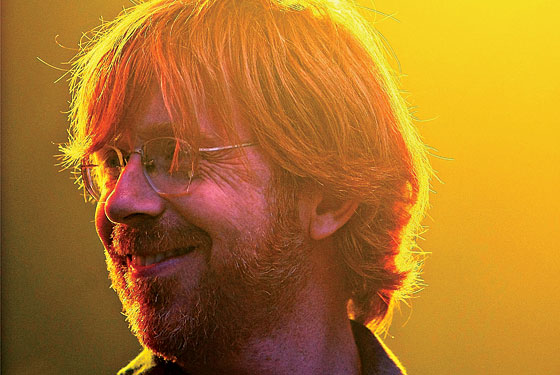
Trey Anastasio, the much-idolized front man of Phish—the band loved and reviled in equal parts for its complex, meandering, genre-hopping jams and Dead Head–like fans—has rightly been labeled a rock-guitar deity for his intricate fingerwork and ability to weave together myriad styles. But as is evident on the afternoon we meet at Café Lalo, on the Upper West Side, he is inspired by a “band” of a very different sort than his own.
“The Philharmonic … they’re my favorite!” gushes Anastasio, who lives in the neighborhood with his wife and two daughters. “It’s the greatest sonic experience and, to me, spiritual experience. I don’t care what they’re playing, I just want to see them tune up. I get so excited!”
He is, in short, a classical-music geek. And this Saturday, he will let his geek flag fly while appearing with that very orchestra at Carnegie Hall. In a benefit for the Philharmonic and his recently deceased sister’s memorial fund, Anastasio will perform a variety of works, highlighted by the local premiere of Time Turns Elastic, a multi-movement piece for guitar, voice, and orchestra (like most of his compositions, it has also morphed into a Phish song).
This is not as far-fetched as it sounds. Anastasio, 44, did not set out to be a rock star. He entered the University of Vermont as a composition student, eventually leaving its Über-traditional music department for the mentorship of a composer in the area, Ernie Stires. “I walked in and he said, ‘Write a two-part invention; here’s the theme, come back tomorrow,’ ” Anastasio recalls. “And when I came back he said, ‘This sounds terrible. Want to know why?’ That was his philosophy: Start writing today; if you’ve got an ear, you’ll know if it sucks.” This was in 1984, when Anastasio and four college friends were forming Phish. “I always dreamed of writing in an orchestral context,” he says. “But when you finish a piece, you want to hear it. So we played everything with Phish.”
As much a phenomenon as a band, Phish is not unlike the Grateful Dead in its dedication to creating frequently pot-fueled live musical events for their fans (dubbed Phishheads), some of whom devote their lives to following the group. Still, even given the elements of classical music in the band’s repertoire, the Phish experience is a long way from Carnegie Hall. But Anastasio says he’s always composing; starting in 2001, he began work with the Vermont Youth Orchestra, and in 2004, despite Phish’s breakup that year (they’ve recently reunited and are touring this summer), he released Seis de Mayo, an album of chamber-size instrumental works. Since then, he’s performed his orchestral compositions with the VYO, Orchestra Nashville, and the Baltimore Symphony Orchestra. It was through Orchestra Nashville that Anastasio met orchestrator Don Hart, “the other musical hero in my life.” Hart looked at Anastasio’s attempts at orchestration, and “one of the first things he said,” remembers Anastasio, “was, ‘I could make the orchestra sound louder with 30 fewer musicians.’ ” (Composers typically write a harmonized melody line; orchestrators often fill in the blanks with proper instrumentation.) Hart has become Anastasio’s primary collaborator; he co-composed sections of Time Turns Elastic and was key in persuading Anastasio—who had second thoughts about singing in front of an orchestra—to keep his vocals in the mix.
Playing with an orchestra “was a little strange at first,” says Anastasio. “I’m so used to playing with a drummer. Even when you watch the conductor, the orchestra lags somewhat.” But he was floored by the communal, formal feel of the ensemble. “I love it,” he insists. “You start when the second hand is on the dot; you can’t be tuning your guitar in the middle of rehearsal.” And it was something of a homecoming for him style-wise. “Before rehearsal, I got really nervous. I didn’t know what I was supposed to wear, like, ‘Oh, God, I’m such a dork!’ ” he says, giggling. “Then I walked in the door and looked around, and these are the exact people I knew from glee club, madrigal singers in middle school. I felt so comfortable, much more so than I ever feel at a rock festival.”
Anastasio views this concert—and the many more he hopes it will spawn with smaller orchestras—as a way to both financially stimulate struggling groups and expose a new audience to the symphony. “I absolutely love the Philharmonic. I also love rock guitar,” he says. “I would put forth that the guitar is the instrument of our age. So why not combine those things in a way the orchestra would respect? Not in a pop way, with really loud guitar, but with advanced harmonic language, used in an elegant way.”
Asher Fisch, the Israeli conductor who will lead the Philharmonic concert, says he was pleasantly surprised by Anastasio’s work. “We as classical musicians always think that rock music used to be sophisticated and then became kind of flat—not challenging, musically speaking,” he explains. “And this is not at all the case with [Anastasio’s] music; it has a depth. It’s composed to the last note. The orchestration is not background music to some kind of vanity thing. It’s really thought out, beautifully done.”
It’s also not exactly what Philharmonic audiences are used to, and Anastasio is aware of the preconceptions he will face. It’s safe to say that, for most classical-music lovers, the idea of a rock star’s fronting an orchestra is akin to Eli Manning pitching for the Yankees. “But that doesn’t bother me, because I kind of agree with them. You don’t want to be the guy they roll their eyes at, like, ‘Ugh, electric guitar,’ ” he says. “I hope Phish fans enjoy it, and I hope old ladies enjoy it, but I’ll probably be more concerned about whether the first cello player is enjoying it.”